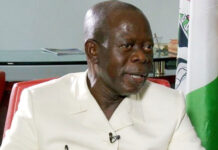The misrepresentation of the good intention of telecom operators to secure a slight adjustment on end-user tariff on voice calls and data services has led to the carriers slowing down on the push, it was learnt.
The operators, acting under the aegis of Association of Licensed Telecom Operators of Nigeria (ALTON), had sought the imprimatur of the Federal Government, via the Nigerian Communications Commission (NCC), to adjust call and data tariff to reflect cost of operation in the country.
The NCC had refused to accede to their demand, a decision insiders said was based on political expediency. In a pushback, the telcos had said their services should not be used as palliative to cushion the impact of ongoing economic hardships in the country.
A source at the weekend, however, said the operators decided to slow down on the push because it was being misunderstood as a push designed to incite members of the public against the government.
“Well, as you can see, we have temporarily suspended our push for adjustment for tariff hike because some elements within were sort of reading political meaning to it and we are business people; we are not politicians. All we are calling for is a sustainable tariff that will make us remain in business. The way things are going now, we may go back to the era of NITEL. I hope no Nigerian would want that to happen,” the source said.
Two subscriber bodies, the National Association of Telecom Subscribers of Nigeria (NATCOM) and Association of Telephone, CableTv, and Internet Subscribers of Nigeria (ATCIS-Nigeria) have differed on the MNOs’ request.
While Deolu Ogunbanjo of NATCOM said a slight increase that would not asphyxiate the subscribers would be a good thing considering that, for over a decade, tariff has not gone up, ATCIS-Nigeria leader Sina Bilesanmi said the operators should first ensure quality service delivery and proper engagement with stakeholders before talking about any hike at all.
“Considering that the current tariff has been existence for over a decade, a slight increase is not a bad idea. Service providers in other sectors have increased costs,” Ogunbanjo said.
Bilesanmi said he sympathized with the operators over the plight but demanded more. “While we acknowledge the unease in the operating environment, we urge the operators to improve service quality; deepen stakeholders’ engagement to achieve win-win situation for all,” he said.
About two years ago, the telcos had proposed a 40 per cent increase call cost per minute, SMS, and data to the NCC as a result of the rising cost of running a business in the country.
Based on their proposal then, the price floor of calls would have increased from N6.4 to N8.95 while the price cap of SMS will increase from N4 to N5.61, according to a letter then entitled: ‘Impact of the Economic and Security Issues on the Telecommunications Sector’ addressed to the NCC by ALTON.
The operators had argued that there had been a 40 per cent increase in the cost of doing business in the country with huge financial impact following the nation’s economic recession in 2020 and the effect of the ongoing Ukraine/Russia crisis which had resulted in an increase in energy costs, increasing opex by 35 per cent.
The letter had read in part, “As the commission may be aware, the power sector under the supervision of its Nigerian Electricity Regulatory Commission of the power sector in November 2020 undertook a review of electricity tariffs to cater for the economic headwinds reported above.
“In view of the foregoing, ALTON considers it expedient for the telecommunications sector to undergo periodic cost adjustments through the commission’s intervention in order to minimise the impact of the challenging economic issues faced by our members.
Details are hereunder: “Upward review of the price determination for voice and data and SMS. Given the state of the economy and the circa 40 per cent increase in the cost of doing business, we wish to request for an interim administrative review of the mobile (voice) termination rate for voice; administrative data floor price, and cost of SMS as reflected in extant instruments.
“With respect to voice an SMS cost, ALTON respectfully requests the commission to consider a mark-up approach to address the upward price adjustment desirable for the industry. We have enclosed herein and marked as ‘Annexure 1’our proposal in that regard.
“For data services, we wish to request that the commission implements the recommendations in the August 2020 KPMG report on the determination of cost-based pricing for wholesale and retail broadband service in Nigeria. Excerpts from the report, are attached and marked ‘Annexure 2’ to provide a further illustration.
“In implementing the said recommendations, however, we recommend that the 40 per cent increase in the cost of doing business be factored in to arrive at a cost price per GB in view of the current economic situation.”
ALTON added that to further help telcos during this economic crisis, NCC should provide other means of penalising operators rather than punitive monetary sanctions; extend the payment timeline of relevant regulatory levies and fees; prevail on the Federal Government to sign the executive order declaring telecoms infrastructure as a critical national infrastructure to mitigate cost spent replacing damaged and stolen infrastructures, among other things.
In the annexure of one section of the letter, the body requested an upward adjustment of the MTR by 40 per cent.
It said, “For large operators, the new interim MTR of N5.46 from N3.90 reflecting 40 per cent increase in the cost of business.
“For small operators, new interim MTR of N6.58 from N4.70 reflecting 40 per cent increase in the cost of business.”
And not too long ago, the MNOs had renewed push to hike the end user tariff of telecom services in the country citing high cost of doing business.
They had also urged President Bola Tinubu to outrightly cancel the recently suspended 7.5per cent value added tax (VAT) imposed on automotive gas oil (AGO) which is the major fuel for powering the telecom sector in the absence of reliable energy from the national grid.
ALTON in a submission to the House Committee on Communication in Abuja, said while other sectors of the economy have increased charges, the telecom sector had not.
ALTON Chairman, Gbenga Adebayo said the cost of doing business in the country has risen sharply in the preceding months due to a myriad of factors generally impacting businesses including macroeconomic headwinds such as inflation, currency devaluation; sustained difficulty in accessing foreign exchange (forex) at an affordable rate; rising energy costs; the rising cost of securing telecommunications facilities and field personnel in the face of worsening insecurity and many others.
“Notwithstanding the foregoing, the pricing regulatory framework has not been reviewed to account for changes in macroeconomic conditions and reflect current cost profile of operators.
“As such, ALTON’s members are unable to price services at a sustainable rate.
“Consumer prices in other sectors have seen a steep rise over the last six years as they adjust to reflect macro-economic realities. However, telco prices have remained flat and even declined. Contrary to the price trends in other sectors, telcos have had to adjust for the macroeconomic headwinds by an increasing erosion of margins; other highly regulated sectors such as power and insurance have implemented price increases over the last year.
“Insurance prices have risen 200per cent with power raising prices by over 40per cent. Telecommunications is the only sector that has not experienced a pricing regulatory framework review raising prices notwithstanding local and global macroeconomic realities,” he said.
According to Adebayo, not only has this impaired investor confidence and depleted available investible funds necessary to optimize infrastructure for improved service delivery, it also threatens the very sustainability of the sector’s operations.
He urged the Committee to drive collaborative partnership with key stakeholders such as the Office of National Security Adviser (ONSA) to secure executive and legislative action on the declaration of telecoms infrastructure as Critical National Infrastructure (CNI) and criminalization of malicious site sealing, access denials, and willful/negligent destruction of telecommunications infrastructure.
This, he argued, could be done either by an Executive Order or relevant amendment of the Cybercrimes Act. He recalled that an attempt was made by the immediate past National Security Adviser (NSA) to secure Presidential approval for an Executive Order (EO), and requested the Committee to ‘respectfully liaise with the current NSA to bring to fruition the EO on CNI’.




